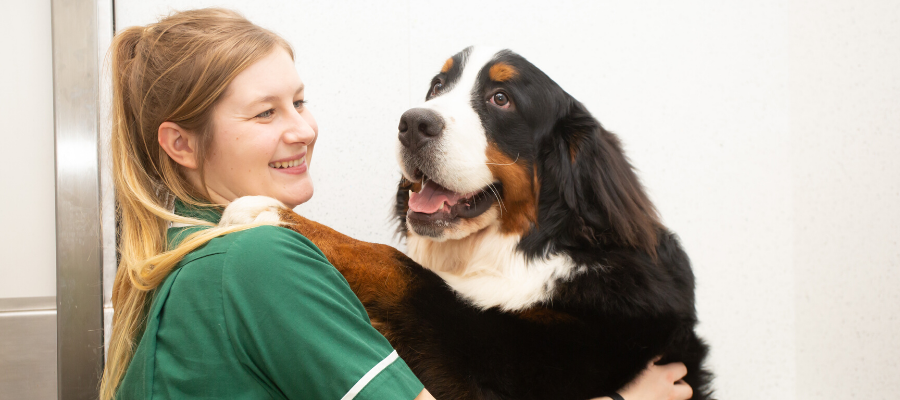What are anal glands?
Anal glands are small glands located either side of your dog’s anal opening. The anal glands or ‘sacs’ are filled with an oily, foul smelling liquid which is naturally expressed each time your dog defecates (poos). Problems can occur when this does not happen on a regular basis, possibly due to passing softer stools which don’t push the material out sufficiently. The material inside thickens, making it harder to express naturally and the glands can become impacted, inflamed and infected. The enlarged glands can become uncomfortable or painful for your dog which they may try to relieve by scooting or licking their bottom.
What problems can occur in the anal glands?
Impacted or blocked anal glands
This occurs when glands do not empty properly and need to be expelled by a vet to relieve the discomfort and pain to your dog. Contents can vary from a normal oily liquid to a thicker material.
Infection
If left impacted, bacteria can build up leading to infection. This may need to be treated under sedation and an anal gland flush performed to get rid of any solid material. An antibacterial gel is then packed into the glands to fight the infection.
Anal gland abscess
Abscesses (pus filled sacs) can form in infected and impacted anal glands, these are very painful and may need to be treated with antibiotics and in some cases lanced under sedation. If not treated this can lead to the infection spreading if the abscess ruptures.
What are the signs my dog is having anal gland issues?
- ‘Scooting’ along the floor with their bottom.
- Licking or chewing at their back-end
- A fishy odour around their bottom
- Straining and whining when passing faeces
- Blood or pus in their faeces
Can my groomer empty the anal glands?
Anal glands can be emptied either ‘internally’ by inserting a lubricated finger into the anus and squeezing the glands individually on each side or ‘externally’ by squeezing outside on both sides of the anal area. Groomers are only permitted to empty them externally after having been trained in the practice by a veterinary surgeon and have knowledge of how often this should be done. If the anal gland contents are thickened, this method may not be adequate to completely empty them. It is recommended that the glands are only emptied when necessary and not as a ‘routine’ treatment when displaying no symptoms, as this can cause further problems.
We believe to achieve the highest level of care possible that anal glands should only ever be emptied by a veterinary surgeon. Groomers, whilst knowledgeable, are unable to correctly diagnose an anal gland issue and may miss a sign that your dog has a serious problem, and it is best practice for them to refer you to speak to your vet if they notice any anal gland issues. Please note, other than a member of the clinical veterinary team, no one should empty your dog’s anal glands internally – this amounts to the practise of veterinary medicine and therefore needs to be done by a veterinary surgeon, or a veterinary nurse under their direction.
Why is my dog having gland issues?
- Gastrointestinal illness with soft, unformed faeces can cause issues; without firm healthy stools to push out the anal gland contents the sacs remain full and can become impacted.
- Skin allergies (atopy) can cause redness, itching and inflammation around the perianal region (the area around the anal glands)
- Poor diet lacking in enough fibre can lead to poorly formed faeces.
- Anatomy – unfortunately some dogs may be unlucky enough to have poorly positioned anal glands which do not naturally empty.
- Being overweight can mean dogs have weaker muscles around their anal glands, making it harder to push out the contents.
- Frequent emptying, when not needed, can cause inflammation and damage leading to problems later on.
Can the anal glands be removed?
Removal of the glands is an incredibly specialised and delicate procedure with increased risks of infection post-operatively due to the area being operated on and as such, should only be considered as a last resort, once all other measures have been tried and failed. In extremely rare cases a vet may recommend the removal of the anal glands, if there is a repeated risk of anal sac abscesses.
What can I do to improve my dog’s anal gland health?
- Ensure they have enough fibre in their diet, speak to your vet about fibre supplements and the correct diet for your dog.
- Seek a vets advice as soon as possible if your dog starts displaying symptoms, before an infection can occur.
- Keep your dog at a healthy weight.
- If your dog displays signs of skin irritation or allergies, speak to you vet about the best way to control these.
- Follow your vet’s advice about how often the glands may need to be emptied, all cases can be different and it’s important to avoid having them emptied to often or too little.
Call us on 01435 864422 if you think your pet may be showing signs of anal gland issues or book a health check via our online booking system.


